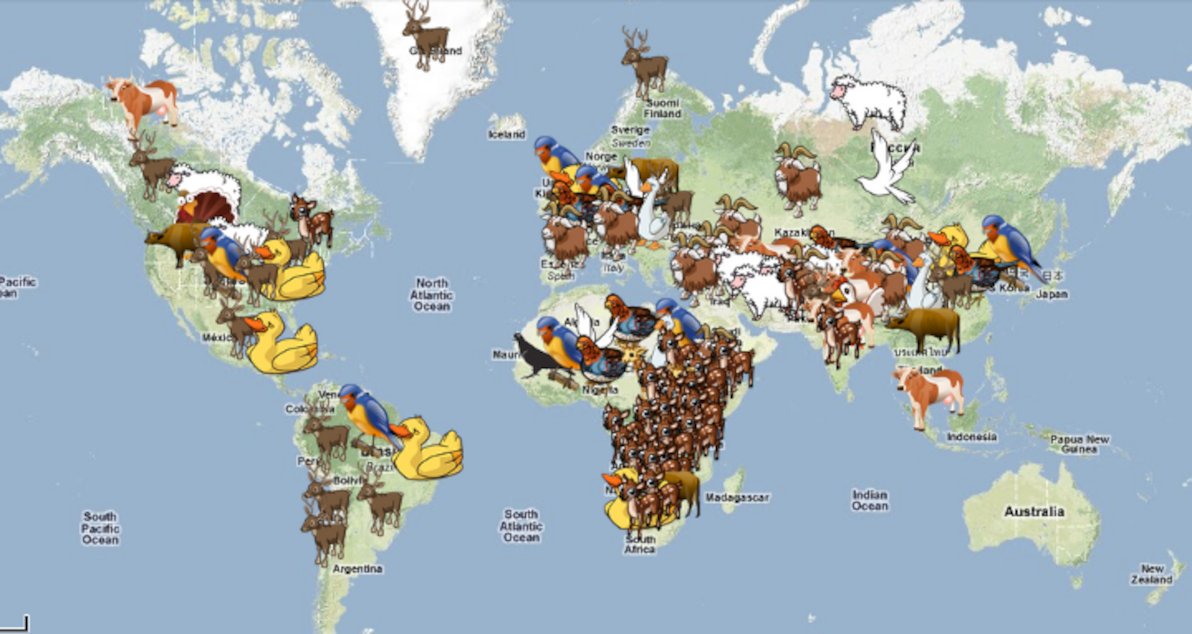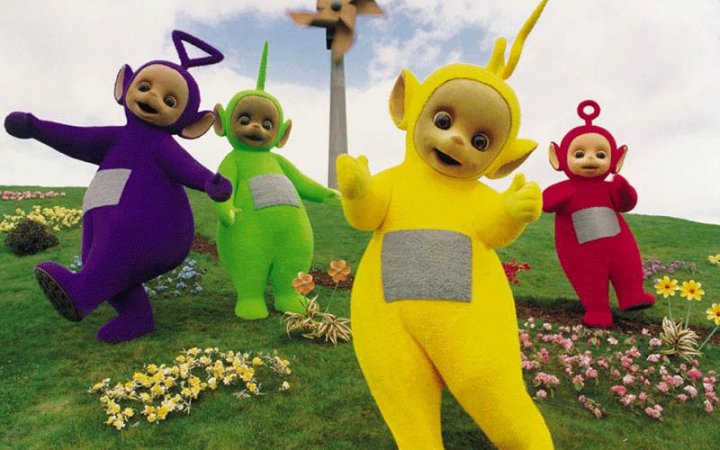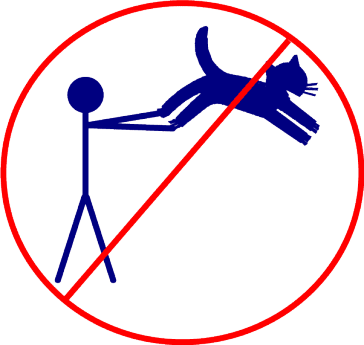
Two weeks ago, the Gillard government succeeded in passing legislation for a new carbon tax through the lower house of the Australian federal parliament. Shortly after, opposition leader Tony Abbott made a "pledge in blood", promising that: "We will repeal the tax, we can repeal the tax, we must repeal the tax".
The passing of the carbon tax bill represents a concerted effort spanning at least ten years, made possible by the hard work and the sacrifice of numerous Australians (at all levels, including at the very top). Australia is the highest per-capita greenhouse gas emitter in the developed world. We need climate change legislation enactment urgently, and this bill represents a huge step towards that endeavour.
I don't usually publish direct political commentary here. Nor do I usually name and shame. But I feel compelled to make an exception in this case. For me, Tony Abbott's response to the carbon tax can only possibly be addressed in one way. He leaves us with no option. If this man has sworn to repeal the good work that has flourished of late, then the solution is simple. Tony Abbott must never lead this country. The consequences of his ascension to power would be, in a nutshell, diabolical.
So, join me in making a blood pledge to never vote for Tony Abbott.
Fortunately, as commentators have pointed out, it would actually be extremely difficult — if not downright impossible — for an Abbott-led government to repeal the tax in practice (please G-d may such government never come to pass). Also fortunate is the fact that support for the anti-carbon-tax movement is much less than Abbott makes it out to be, via his dramatic media shenanigans.
Of course, there are also a plethora of other reasons to not vote for tony. His hard-line Christian stance on issues such as abortion, gay marriage, and euthanasia. His xenophobia towards what he perceives as "the enemies of our Christian democratic society", i.e. Muslims and other minority groups. His policies regarding Aboriginal rights. His pathetic opportunism of the scare-campaign bandwagon to "stop the boats". His unashamed labelling of himself as "Howard 2.0". His budgie smugglers (if somehow — perhaps due to a mental disability — nothing else about the possibility of Abbott being PM scares the crap out of you, at least consider this!).
In last year's Federal election, I was truly terrified at the real and imminent possibility that Abbott could actually win (and I wasn't alone). I was aghast at how incredibly close he came to claiming the top job, although ultimately very relieved in seeing him fail (a very Bush-esque affair, in my opinion, was Australia's post-election kerfuffle of 2010 — which I find fitting, since I find Abbott almost as nauseating as the legendarily dimwitted G-W himself).
I remain in a state of trepidation, as long as Abbott continues to have a chance of leading this country. Because, laugh as we may at Gillard's 2010 election slogan of "Moving Forward Together", I can assure you that Abbott's policy goes more along the line of "Moving Backward Stagnantly".
Image courtesy of The Wire.
]]>
Geeks. The socially awkward, oft-misunderstood tech wizzes that are taking over the world. And hippies. The tree-huggin', peace-n-lovin' ragtags that are trying to save the world, one spliff at a time.
I've long considered myself to be a member of both these particular minority groups, to some extent. I'm undoubtedly quite a serious case of geek; and I also possess strong hippie leanings, at the least. And I don't believe I'm alone, either. Nay — the Geekius Hippius is, in fact, a more common species than you might at first think.
I present here a light-hearted comparison of these two breeds. Needless to say, readers be warned: this article contains high level stereotyping.
Demographics
Gender balance. Geeks have long been smitten with the curse of the sausage-fest. In my undergrad IT program, there were two girls and 23 guys; this is pretty well on par, in my experience. I estimate that 90-95% male, 5-10% female, is a not uncommon gender ratio in geek circles. With hippies, on the other hand, it's all much more balanced, with my estimate being 40-50% male, 50-60% female, being a common gender ratio amongst a given group of hippies. So, yes, male geeks should consider hanging out with hippies more, as there are opportunities to meet actual real-life females.
Occupation / wealth. Geeks are typically engaged in professional full-time work; and while they're not always paid as much as they deserve (being oft exploited by less tech-savvy but more ruthless business types), they're generally comfortable, and can even expect to acquire some financial investments in life. Hippies are frequently unemployed and penniless, with many engaged in work for NGOs and other struggling outfits that can barely afford to remunerate them. Many hippies truly do possess almost no financial wealth, although there are plenty of exceptions.
Socio-economic background. A large number of geeks hail from white, middle-class homes. Asian geeks also make up a sizable contingent (with Korean StarCraft fanatics alone enjoying a massive representation); and the infamous "Russian hackers" are more than just a myth. Hippies are perhaps even more predominantly white and middle-class, despite their typical rejection of said heritage. Some upper-class folk enjoy going undercover and slumming it as hippies. Migrant groups are less likely to identify as hippies, although they have a presence in the movement too.
Habits
Fashion. The geek is easily identifiable by his/her conference t-shirt or geek humour t-shirt (or possibly a faeces-coloured formal shirt), accompanied with nondescript jeans, and a practical pair of runners. A rather oversized pair of glasses is a geek hallmark, and a tad bit of facial hair doesn't go astray either. The hippie can be spotted in his/her head-to-toe outfit of thoroughly worn-out and faded vestments, including: a festival t-shirt, stripey pants, and thongs (or he/she may simply go barefoot). On the hair and accessories front, the hippie is typically equipped with: dreads, tats, bandanas, artesanal jewellery, and hair in all parts (ladies not excluded).
Preferred hangouts. The native habitat of the geek is an air-conditioned environment, equipped with fast, reliable Internet. Common hibernation spots include libraries, office spaces, and Internet cafes. Geeks are averse to lingering in public spaces for extended periods, on account of the overwhelming presence of normal people engaged in healthy socialising. The hippie's preferred urban hangout is a dilapidated run-down venue, sporting some blaring alternate music, Che Guevara posters, and coffee tables constructed from used nappies. Hippies are also accustomed to central public spaces, on account of the demonstrations that they stage in them. Additionally, they enjoy hanging out in the bush, naked near a river, with a pleasant campfire crackling nearby.
Diet. The geek subsists on a staple diet of pizza, coke, and cheap beer. Other fast food such as Asian, Mexican, and Italian take-away is also a source of nourishment. Nevertheless, more health- or consumer-conscious geek diets do exist. The hippie diet is significantly different, in that it's… well, far more hippie. A vegetarian or even vegan regime is standard fare. The hippie is quite likely to cook most of his/her own cuisine, and will often religiously enforce a devotion to organic ingredients.
Drug use. Geeks are typically averse to most drugs, although there are exceptions. Hippies, on the other hand, are massive consumers of a plethora of drugs across the board. In particular, the concept of a non-weed-smoking hippie is virtually an oxymoron.
Interests
Musical abilities. Both geeks and hippies are often musical types. Geeks are more likely to wield an old-school instrument (e.g. piano, trumpet, violin), to possess a formal musical education, and to sport experience in choirs or ensembles. Jazz is a preferred geek genre; and synth music composition, along with DJ'ing, are all the geek rage. Hippies are more likely proponents of a percussion or woodwind instrument (e.g. bongos, didgeridoo). Possession and strumming of a guitar is considered valid ID in most hippie circles. Hippies are commonly self-taught musicians, and are very likely to participate in a small band or a musical clan.
Sport. Not the strong point of the geek, who will generally struggle to name the most popular sport of his/her country, without the aid of Wikipedia. However, geeks are often fans of recreational or adventure sport. Similarly, hippies seldom concern themselves with the sports of the Bourgeoisie "masses" (although many are at least somewhat skilled in playing them). They too enjoy recreational sport, all the more if practised in a pristine wilderness environment. Many hippies are also skilled in performance or "circus" sports, such as tightrope and juggling.
Preferred books and movies. The geek species enjoys an intimate relationship with the science fiction and fantasy genres. A geek lacking at least a rudimentary mastery of Jedi mind control, Sindarin Elvish, or Klingon, is at risk of banishment from geekdom. The hippie is fond of such revered authors as Karl Marx and Mahatma Gandhi, and enjoys the (free) screening of documentaries (preferably leftist opinionated ones). The hippie also commonly nurtures an affection for the science fiction and fantasy genres.
World views
Political views. The geek is a left-leaning creature, but is also sceptical of the extreme left (as he/she is of most anything). The geek is an environmentally conscious being, but is generally reluctant to support socialist and other movements. To call the hippie a left-leaning creature is an understatement at best. The hippie is a creature of causes, diving head-first into socialism, along with feminist / gay / indigenous / migrant advocacy groups. The hippie can be relied on to provide a highly opinionated, and reasonably well-educated, opinion on most any sphere of world affairs.
Religious views. Most geeks are quite conservative on this front, sticking to old-school religions such as Christianity, Judaism, and Islam; although few geeks are strongly religious. Atheist geeks are not uncommon either. Hippies almost unanimously share a vehement rejection of traditional religion. Many alternatives appeal to them, including Eastern religion, Paganism, mysticism, meditation and Yoga. Many hippies are also vocal atheists or nihilists.
Images in collage courtesy of:
]]>Australia and New Zealand are two countries located very far from the Middle East, the home of Judaism and Islam. Their native wildlife is completely different to that found anywhere else in the world. Of course, since European settlement began, they've been thoroughly introduced to the fauna of the wider world. Indeed, these two countries are today famous for being home to some of the world's largest sheep and cattle populations.
However, let's put aside the present-day situation for now, and take ourselves back in time a thousand or so years. Artificial transcontinental animal transportation has not yet begun. The world's animals still live in the regions that G-d ordained for them to live in. G-d has peppered almost every corner of the globe with at least some variety of kosher birds and mammals. Every major world region, bar one.
My fellow Aussies and Kiwis, I'm afraid the verdict is clear: we are living in the Land that G-d forgot.
Legal recap
Can it really be true? is there not a single native Aussie or Kiwi bird or mammal, that's fit for a chassid's shabbos lunch? Is our Great Southern Land really the world's Traif Buffet Grande?
Before we jump to such shocking conclusions, let's review some basic definitions. According to Jewish law, a mammal is kosher if it has split hooves and chews its cud (plus, it should be herbivorous). For birds, there is no clear and simple rule in determining kosher status, and so the most important rule is that there is a lond-standing tradition (a mesorah) of its being kosher (although there are some guidelines for birds, e.g. only non-predatory birds, peelable gizzard / stomach lining).
The kosher map
After doing some pretty thorough research, I've discovered that there are only eight groups of fauna in the world whose meat is kosher. These groups, and their kosher species, are:
- Cattle / cow: Banteng; Gayal; Muskox; Taurine cattle / Ox / Domestic cow; Yak; Zebu.
- Sheep: Argali; Bighorn; Dall; Domestic sheep; Mouflon; Snow sheep; Urial.
- Bison / buffalo: American buffalo; Cape buffalo; Water buffalo; Wisent.
- Goat / ibex: Alpine ibex; Caucasian tur; Domestic goat / Wild goat; Goral; Markhor; Nubian ibex; Siberian ibex; Spanish ibex; Takin; Walia ibex.
- Deer: Brocket deer*; Elk; Eurasian Elk; Huemul*; Moose; Mule deer; Muntjac / Barking deer; Pampas deer*; Pudú*; Reindeer / Caribou; Roe deer; Taruca*; Wapiti; White-tailed deer.
- Birds: Chicken / Capon; Dove; Duck; Goose; Guineafowl; Muscovy duck; Partridge; Pheasant; Pigeon; Quail; Sparrow; Swallow; Turkey.
- Giraffidae: Giraffe; Okapi.
- Antelope: Blackbuck; Blesbok; Bongo; Bushbuk; Dik-dik; Eland; Gazelle; Gerenuk; Hartebeest; Impala; Klipspringer; Kudu; Lechwe; Nilgal; Nyala; Oribi; Oryx / Gemsbok; Pronghorn; Reedbuck; Sitatunga; Springbok; Steenbok; Topi; Tsessebe; Waterbuck; Wildebeest.
* For these South American deer species, I found no kosher list that could verify their kashrut status; however, many other sources explicitly state that all deer is kosher, and these species are definitely all deer.
All the species of cattle originate from Asia (particularly from the Indian Subcontinent), except for the Muskox which is from the Arctic regions of North America (and the inclusion of the Muskox is stretching the definition of cattle somewhat). Sheep and goats originate mainly from the Middle East and surrounds, except for the Bighorn and Dall sheep (which are North American). All three of cattle, sheep, and goats, are believed to trace their domesticated origins to the Fertile Crescent area of the Middle East.
Bison are closely related to cattle, but are ultimately a different group. Bison are one of the least clustered of the animal groups discussed here, being scattered all over the world: the American buffalo is North American; the Cape buffalo hails from South Africa; the Water buffalo is native to South-East Asia; and the Wisent is of Eastern European origin. The deer are also a widely dispersed group, being spread over all the Americas, Europe, and Asia.
The large number of antelope species are almost all from Eastern and Southern Africa. Exceptions include the Blackbuck, which is of Indian origin; and the Pronghorn, which is the North American antelope ambassador. The Giraffe and its only (surviving) close relative, the Okapi, both hail from Central Africa.
There are also the birds, most of which originate from an extensive number of regions and continents (including Europe, Asia, Africa, and the Americas), due to their being migratory. The Chicken is of Indian Subcontinent origin; the Muscovy duck hails from Central / South America; the Pheasant is of Eastern European origin; and the Turkey is North American.
And so, here we can see all of these animals, indicated quite roughly on a world map (image is of this kosher animals Google map):

No kosher tucker
The map speaks for itself, really. For most of human history, Oz and NZ went unnoticed to the rest of the human-inhabited world. Clearly, the Man Up High also didn't notice those funny bits Down Under, when he was plonking kosher land animals down upon the rest of the Earth. Or maybe — Day 6 being a Friday and all — he knocked off early and went to the pub, and he just never got around to koshering Australasia.
No kosher marsupials — forget about Roo, Wallaby, Koala, and Wombat — they're all traif. Same deal for the monotremes: Platypus and Echidna are off the menu. Not to mention croccies… oy vey! Oh, and I know you were thinking about Emu — but you can stop thinking, I already checked. As for NZ, it hasn't even got a single native land-dwelling mammal, let alone a kosher one. I guess even the goyim have to make do around there — although at least they could roast up a Kea or a Kiwi if they started feeling peckish.
Seriously, it's pretty slack. I know that the Aborigines and the Maoris never even had the opportunity to hear about kosher (which is bad enough). But assuming they somehow had caught wind of it, and had decided to join the bandwagon; surely, they would have felt pretty jaded and ripped off, upon learning that the All-Merciful One had given them the cold shoulder in the meat department.
Possible explanations
We all know that Australia is the oldest continent on Earth. So, I can think of one explanation easily enough. G-d created the world 6,000 years ago. The whole world, that is, except Oz and NZ. He created those places 40,000 years ago; he plonked the Roos and the Aborigines down in Oz; and he just let 'em sit there for 34,000 years, and hang around idly until he popped back and finished off the rest of the world. If this theory is true, then I guess being left out to dry in the bush for that long would make the Aborigines feel pretty jaded anyway (apart from their already feeling jaded re: lack of kosher meat on their continent).
Another theory: maybe Oz and NZ were a bit of a hippie commune experiment, and G-d decided that if (by some bizarre turn of events) the Blackfellas did happen to hear about kashrut and (even more bizarrely) liked the sound of it, then they should stick to a veggie diet anyway. Or, if they got really desperate, there are — after all — native kosher fish on Oz and NZ's coasts; so they could grill up a salmon or two. But, as any carnivorous man knows, fish just ain't no substitute for a good chunk of medium-rare goodness (yes, I know, I'm a crap hippie).
We should also consider that, as everyone knows, Australasia was a bit of an experimental zone in general for the Man Up High. Some have even gone further, and argued that Australasia was His dumping ground for failed experiments. If this was the case, then it logically follows that He would never place any kosher animals — which we can only assume were what He considered his greatest success story — in that very same manure hole.
I believe I already mentioned the theory about knocking off early on Friday afternoon and going to the pub. (In fact, if that theory is true, it would seem that that act has been G-d's greatest legacy to Australasia.)
Forgotten Land
We already knew about quite a few fairly essential things that G-d forgot to put in Australia. For example, water. And rivers that have water. And mountains (real ones). Also non-poisonous snakes and spiders. And something (anything) in the middle (apart from a big rock).
This is just further proof that Australia really isn't the Chosen Land. No non-traif meat available. Anyway, at least you can thank Him for the next time you're stuck in the Outback, when a feast of witchety grubs could save you from starvation.
Additional references
- What did Australian Aborigines eat?
- What food and medicine did the aboriginals eat?
- Are kangaroos kosher?
- Are kangaroos kosher? (another source)
- Who eats what animals?
- The Long March of the Koalas
- Is emu kosher?
- Are peacocks and peacock eggs kosher?
- The Halachic Tale of Three American Birds: Turkey, Prairie Chicken, and Muscovy Duck
- Kosher animals (big list)
- Kosher list
- Wikipedia: kosher animals
- Kosher animal list
- Anyone for a Giraffe Burger?
- Kashrut of Exotic Animals: The Buffalo
- What's The Truth About Giraffe Meat
- Kashrut overview
- Living the Law: Reinforcing the Tradition with a Palpable Precedent
- Is quail kosher?
To start with, let's focus on the more common and important meanings of these words. The most fundamental meaning of "on" and "off", is to describe something as being situated (or not situated) atop something else. E.g: "the dog is on the mat", and "the box is off the carpet". "On" can also describe something as being stuck to or hanging from something else. E.g: "my tattoo is on my shoulder", "the painting is on the wall". (To describe the reverse of this, it's best to simply say "not on", as saying "off" would imply that the painting has fallen off — but let's not go there just yet!).
"On" and "off" also have the fundamental meaning of describing something as being activated (or de-activated). This can be in regard to electrical objects, e.g: "the light is on / off", or simply "it's on / off". It can also be in regard to events, e.g: "your favourite TV show is on now". For the verb form of activating / de-activating something, simply use the expressions: "turn it on / off".
But from these simple beginnings… my, oh my, how much more there is to learn! Let's dive into some expressions that make use of "on" and "off".
Bored this weekend? Maybe you should ask your mates: "what's on?" Maybe you're thinking about going to Fiji next summer — if so: "it's on the cards". And when you finally do get over there, let your folks know: "I'm off!". And make sure your boss has given you: "the week off". If you're interested in Nigerian folk music, you might be keeping it: "on your radar". After 10 years spreading the word about your taxidermy business, everyone finally knows about it: "you're on the map". And hey, your services are "on par" with any other stuffed animal enterprise around.
Or we could get a bit saucier with our expressions. Next time you chance to see a hottie at yer local, let her know: "you turn me on". Or if she just doesn't do it for you: "she turns me off" (don't say it to her face). Regarding those sky-blue eyes, or that unsightly zit, respectively: "what a turn-on / what a turn-off". After a few drinks, maybe you'll pluck up the courage to announce: "let's get it on". And later on, in the bedroom — who knows? You may even have occasion to comment: "that gets me off".
And the list "goes on". When you're about to face the music, you tell the crew: "we're on". When it's you're shout, tell your mates: "drinks are on me". When you've had a bad day at work, you might want to whinge to someone, and: "get it off your chest". When you call auntie Daisy for her birthday, she'll probably start: "crapping on and on". When you smell the milk in the fridge, you'll know whether or not it's: "gone off".
Don't believe the cops when they tell you that your information is strictly: "off the record". And don't let them know that you're "off your face" on illicit substances, either. They don't take kindly to folks who are: "high on crack". So try and keep the conversation: "off-topic". No need for everything in life to stay: "on track". In the old days, of course, if you got up to any naughty business like that, it was: "off with your head!".
If you're into soccer, you'll want to "kickoff" to get the game started. But be careful you don't stray: "offside". If you can't "get a handle on" those basics, you might be "better off" playing something else. Like croquet. Or joining a Bob Sinclair tribute band, and singing: "World, Hold On".
That's about all the examples I can think of for now. I'm sure there are more, though. Feel free to drop a comment with your additional uses of "on" and "off", exposed once and for all as two words in the English language that "get around" more than most.
]]>I've lived in Sydney all my life. I've almost always lived quite squarely in Shelbyville myself. However, since the age of 18, I've gotten to know most of the popular nightlife haunts pretty well. And since entering the world of student share-houses, I've also become pretty familiar with the city's accommodation hotspots. So, having this background, and being a fan of online mapping funkiness, I decided to sit down and make a map of the trendiest spots in Sydney to live and play.

This map represents my opinion, and my opinion only. It's based on where I most commonly go out at night with my friends and colleagues, and on where my friends and colleagues live or have lived. I make no pretense: this map is biased, and any fellow Sydney-sider will no doubt have numerous criticisms of its inclusions and its omissions. If you wish to voice your qualms, feel free to leave a comment. I'll do my best to go through and justify the most controversial details of the map. But, in general, my justification is simply that "this is a map of my Sydney, so of course it's not going to be exactly the same as a map of your Sydney".
In this map, the coloured dots represent nightlife hotspots. In general, they represent exact streets or clusters of streets that are home to a number of bars, although some dots are pinpointing individual bars. The coloured regions represent accommodation hotspots. These regions should be thought of as covering a general area — usually a suburb or a group of neighbouring suburbs — rather than covering exact streets.
The nightlife hotspots and the accommodation hotspots almost always overlap. You could say that one defines the other, and vice versa. The main exception to this rule is the Sydney CBD (i.e. George St, Martin Place, and Darling Harbour), which has the biggest nightlife concentration of anywhere, but which has almost no permanent accommodation, apart from a few recently-built towering monstrosities (and I wouldn't consider them trendy, as they're super-pricey and utterly soulless). There are a few other exceptions, which I'll get to shortly.
As you can see, the map is concentrated around the city centre, the Inner West, and the Eastern Suburbs. As a (recently-graduated) Uni student and a young professional, these are the areas that are almost exclusively on my radar these days.
The trendy areas
- Inner West. Glebe, Newtown, Annandale and Leichhardt are the heart of where to stay and where to party in the Inner West. In particular, Newtown — the hippie student capital of Sydney — is one of my most frequent night hangouts. The suburbs surrounding Newtown (e.g. Erskineville, Stanmore) are also great places to live, although I can't say I party in those places myself.
- Around City Centre. Surry Hills is on the CBD's doorstep, and it's a very trendy place both for living and for partying. Surry Hills is also where I work, so I've inevitably been frequenting many of its watering-holes of late. Ultimo and Chippendale are also close to my heart, as that's the neighbourhood of my old uni. At the last minute, I included Pyrmont, as it has nice accommodation these days; however, its only real night attraction is the casino, and casinos ain't particularly my thing. The Rocks is special, because it's a really good place to go out for drinks, but it's basically inside the CBD, and I don't know anyone who actually lives there. I reluctantly decided to include Darlinghurst and The Cross, as they're becoming increasingly hip places of abode — and they're also home to Sydney's most intense all-night party joints — but personally, I don't go out to that area at night, and I don't see the attraction of living next door to hookers and crack junkies.
- Eastern Suburbs. Much of the East is overpriced beyond trendy standards, and/or is suburban Shelbyville. I've identified five main spots that go (more-or-less) in a line between City and Surf, and that aren't in this category: Paddington, Woollahra, Bondi Junction, Bondi, and Bondi Beach. Woollahra doesn't offer much nightlife itself, but its location between Paddington and The Jungo means that plenty of choice is nearby. Double Bay has some decent bars come evening-time, but considering that the only person I know who lives there is my Grandma, I can't really call it a trendy place to live. Bronte is a bit of a special case: I've never been out there at night, and I don't think it has much in the way of bars, but I know quite a few people that have lived there; plus, it really is a lovely beach. Coogee is actually the most remote place (from the city) that made it on the map, but there's no way I could have left it out. Also, the Randwick / UNSW area probably doesn't seriously qualify as a trendy spot; but because so many of my friends study at and/or live near UNSW, it qualifies for me.
Sorry, it's Shelbyville
- Balmain. Also surrounding suburbs (i.e. Rozelle, Lilyfield, Drummoyne). I know that plenty of young and trendy people live and hang out in these places. But personally, I don't know anyone who lives in these areas, and I've never been out to them at night.
- Harbour bays in the East. This mainly includes Elizabeth Bay, Rose Bay, and Watsons Bay. I know they all have some decent night hangouts. But all of them are also luxury suburbs, not for mere mortals; I for one don't have any friends living in those places.
- Manly. I know that Manly people will never forgive me for this. I also know that Manly is a super-cool place both to live and to hang out. But I'm sorry — it's just too far from everywhere else! This is why people in non-Shelbyville Sydney, whether justified or not, call Manly Shelbyville.
- Lower North Shore. North Sydney, Crows Nest, Neutral Bay, and Mosman. All Shelbyville. I'm a North Shore boy, so having lived there, and having now moved out into the real world, I should know. Yes, there are bars in all these suburbs. But does anyone from out of the area actually go to them? And would anyone actually move to these areas in order to be "where the action is"? No.
- Everywhere else in Sydney is well and truly Shelbyville. My home through the teenage years — the mid North Shore around Chatswood and Gordon — is Shelbyville. No questions asked. My current abode — the Strathfield and Burwood area — is Shelbyville. No exception. The Shire is Shelbyville. Rockdale / Brighton is Shelbyville. Maroubra is Shelbyville. The Northern Beaches are Shelbyville. Parramatta is Shelbyville. And the Rest of the West is so daym Shelbyville it's not funny.
Further reading
Some sources that I used to get a feel for different opinions about Sydney's cool corners:
]]>After my recent series of blog posts discussing serious environmental issues, I figured it's time to take a break, and to provide a light interlude that makes you laugh instead of furrow your eyebrows. So let me take you on a trip down memory lane, and pay a tribute to those golden days when text was ASCII, and download speeds were one digit.
What it was like...
- IRC was all the rage. High-school teenie-boppers knew their /msg from their /part, and they roamed the public chat networks without fear of 80-year-old paedophiles going by the alias "SexySue_69". ICQ was a new and mysterious technology, and MSN had barely hit the block.
- 56kbps dial-up Internet was lightning fast, and was only for the rich and famous. All the plebs were still on regular old 14.4. Downloading a single MP3 meant that your entire afternoon was gone.
- IE3 and Netscape 3 were the cutting-edge browsers of choice. Ordinary non-geeky netizens knew what Mosaic and Lynx were. "Firefox" was (probably) a Japanese Anime character from Final Fantasy VII.
- Most of our computers were running the latest-and-greatest offering from Microsoft, remembered (with horror) for all eternity as "Windows 98". Fans of the Apple Macintosh (and yes, its full name was still used back then) were equally fortunate to be using Mac OS 9.
- On the web design front, table-based layouts were the only-based layouts around.
- If you wanted to show that you were really cool and that you could make your website stand out, you used the HTML <blink> tag.
- Long before MySpace, personal home pages on Angelfire and GeoCities was what all your friends were making.
- Life-changing interactive technologies such as ActiveX and RealPlayer were hitting the scene.
- There was no Google! If you wanted to search the 'Net, then you had a choice of using such venerable engines as Lycos, Excite, or even HotBot.
- AOL were still mailing out their "Get started with AOL" CDs all over the world for free. Bored young high-schoolers worldwide were using this as a gateway to discovering the excellent utility of CDs as damage-inflicting frisbees.
- Forget BitTorrent: back then, unlimited quantities of pirated music were still available on Napster! Search, click, wait 2 hours, and then listen to your hearts' content.
- There was no spam! Receiving an e-mail entitled "Make millions without working" or "Hot girls waiting to meet you" were still such a novelty, that it was worth printing them out and showing them to your mates, who would then debate whether or not the said "hot girls" were genuine and were worth responding to.
- People (no — I mean real people) still used newsgroups. They were worth subscribing to, replying to, and keeping up with.
- Blasphemies such as Word's "Save as HTML" feature, or Microsoft FrontPage 98, were still considered "professional web design tools".
- Character encoding? UTF-8? Huh?
- Drupal was not yet born.
- The Internet was still called the "Information Superhighway".
What it's still like
- There's still Porn™. And plenty of it.
- The same people who still look at porn, are still reading Slashdot every day. And they're still running the same version of Slackware Linux, on a machine that they claim hasn't needed a reboot since 1993. And they're still spilling fat gobs of pizza sauce all over their DVORAK keyboards. Which they still believe will take off one day.
- There are still n00bz. In fact, there are more now than there ever were before.
And very hypnotic

I've heard tales for many years that the Teletubbies have a hypnotic effect on little kids. More recently, I've witnessed this hypnosis first-hand, as it infected my little step-sister. Today, the final blow came. For a few terrifying minutes, I myself fell victim to the magnetism of the Teletubbies.
The thing that I found most compelling to watch was the landscape. It's so neat, so bright and green and pastel-coloured, so blatantly artificial (although I've heard, ironically, that the show is actually filmed on location at a real country farm in England, with a fair bit of special effects added in). It looks like something out of a computer game. Or like an alien planet (insert sinister laugh here).
I guess the British love the show so much because, unlike the real England, it never rains in Teletubbyland! There's (almost) always a clear blue sky, and a happy, smiling, laughing orange sun shining down from overhead.

Speaking of which, what is the deal with that stupid baby-faced sun? Another strangely hypnotic feature of the show, the sun seems to randomly smile, laugh, and make weird baby noises. There are also numerous eerie moments in the show, where the sun and the teletubbies just stop whatever they're doing (which generally isn't much), and stare at each other for a while, apparently locked in a fervent lover's trance.
The narrator
This has to be one of the freakiest things about the Teletubbies. I don't know where they found this guy, but he's bad news. It's not just his incredibly insightful comments, such as "Teletubbies love each other very much" (said as Teletubbies embrace in a [literally] pear-shaped group orgy). It's the way he says them. He's completely unexcited, completely unenthusiastic. He could teach Bernie Fraser how to talk boring.
Not only is he utterly uninspiring with his droning monotone; he also repeats everything over and over again. For example:
Dipsy's hat
Dipsy's hat
Fancy that
It's Dipsy's hat.
This most eloquent of poems must have been recited at least 5 times, in the space of just one episode. I'm not sure if the intent is to hypnotise or to tranquilise; the end result is a bit of both.
Flubs
Then there's all the other things: the visual appearance of the Teletubbies themselves; the baby-like chatter that they constantly engage in; the distinctive (no doubt alien) antennae that they all have implanted in their cotton wool skulls; the random rabbits; etc. All up, the Teletubbies makes for a most disturbing 30 minutes of entertainment.
Child psychologists are right to worry about their effect on the next generation. South Park and The Simpsons are right to... errr... critique them. In fact, white Western toddlers the [white Western] world over would be much better served, in my opinion, by learning about the good 'ol American values of animal cruelty, fast food addiction, death by mutilation, panoptic racism, and so on (all of which can be found in South Park and The Simpsons, amongst other quality TV shows); than they would be by obvserving the bouncing motions of a group of oversized talking beanbags.
Those flubby tubbies are starting to freak me out.
Shake what yo' Tubbie Momma gave you
Check out these videos — they're far less disturbing than the real Teletubbies TV episodes:
]]>But have you ever stopped to think about what this proverb means? I mean, seriously: who the hell swings cats? Why would someone tell you that there isn't enough room to swing a cat somewhere? How do they know? Have they tried? Is it vitally important that the room is big enough to swing a cat in? If so, then whoever resides in that room:
- is somewhat disturbed; and
- shouldn't own a cat.
Now, correct me if I'm wrong - I'm more a dog person myself, so my knowledge of cats is limited - but my understanding has always been that swinging cats around in a circular arc (possibly repeatedly) is generally not a good idea. Unless your cat gets a bizarre sense of pleasure from being swung around, or your cat has suddenly turned vicious and you're engaged in mortal combat with it, or you've just had a really bad day and need to take your anger out on something that's alive (and that can't report you to the police), or there's some other extraneous circumstance, I would imagine that as a cat owner you generally wouldn't display your love and affection for your feline friend in this manner.
Picture this: someone's looking at an open house. They go up to the real estate agent, and ask: "excuse me, but is there enough room to swing a cat in here? You see, I have a cat, and I like to swing it - preferably in my bedroom, but any room will do - so it's very important that the main bedroom's big enough." I'm sure real estate agents get asked that one every day!
What would the response be? Perhaps: "well, this room's 5.4m x 4.2m, and the average arm is 50cm long from finger to shoulder, and the average cat is roughly that much again. So if you're going to be doing full swings, that's at least a 2m diameter you'll be needing. So yeah, there should be plenty of space for it in here!"
I'm guessing that this proverb dates back to medieval times, when tape measures were a rare commodity, and cats were in abundance. For lack of a better measuring instrument, it's possible that cats became the preferred method of checking that a room had ample space. After all, a room that you can swing a cat around in is fairly roomy. But on the flip side, they must have gone through a lot of cats back then.
Also, if swinging animals around is your thing, then it's clear that cats are the obvious way to go. Dogs dribble too much (saliva would fly around the room); birds would just flap away; rabbits are too small to have much fun with; and most of the other animals (e.g. horses, cows, donkeys) are too big for someone to even grab hold of their legs, let alone to get them off the ground. If someone told you that a room was big enough to swing a cow around in, it just wouldn't sound right. You'd wonder about the person saying it. You'd wonder about the room. You'd wonder about the physics of the whole thing. Basically, you'd become very concerned about all of the above.
In case you know anyone who's in the habit of swinging cats, here's a little sign that you can stick on your bedroom door, just to let them know that funny business with cats is not tolerated in your corner of the world:

I hope that gives you a bit more of an insight into the dark, insidious world of cat swinging. Any comments or suggestions, feel free to leave them below.
]]>